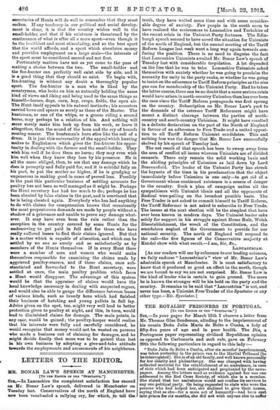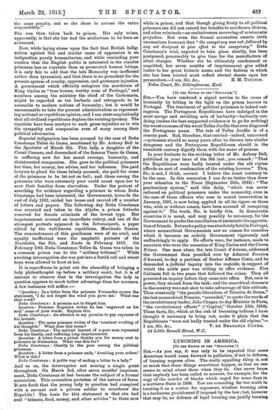THE ROYALIST PRISONERS IN PORTUGAL.
[To THE EDITOR. Or THE " SPECTATOR.."] SIR,—In your paper for March 15th I observe a letter from Mr. Thomas Glee; Sandeman, alluding to the imprisonment of his cousin Doiia Julia Maria de Brito e Cunha, a lady of fifty-five years of age and in poor health. The Die, a Portuguese paper representing civilized Republican opinion as opposed to Carbonaria and mob rule, gave on February 20th the following particulars in regard to this lady :— " Dona Julia do Brito e Cunha, after six months' imprisonment, was taken yesterday in the prison van to the Martial Tribunal [to be interrogated]. She is of an old family, and well known personally- for her charity and philanthropy. She was charged with having collected material for the establishment of an ambulance, in case of riots which had been anticipated and prophesied by the news- papers. Among the letters used as evidence against her was one addressed to the Red Cross Society, of which she is a member. She stated that her ambulance would not confine its services to any one political party. On being requested to state who were the persons who had helped her, sho declined to give their names, saying that as she—for a mere act of humanity—had bean cast into prison for six months, she did not wish anyone else to suffer
the same penalty, and so she chose to assume the entire responsibility."
She was then taken back to prison. Her only crime, apparently, is that she has had the misfortune to be born an aristocrat.
Now, while laying stress upon the fact that British indig- nation against this and similar cases of oppression is an indignation purely humanitarian, and while reminding your readers that the English public is interested in the royalist prisoners less as royalists than as persecuted human beings, it is only fair to add that the late Monarchy was inefficient rather than tyrannical, and that there is no precedent for the present system of cruelty, oppression, and grotesque injustice. A government which officially eulogizes the murderers of King Carlos as "true heroes, worthy sons of Portugal," and numbers among the ministry the chief of the Carbonaria, might be regarded as too barbaric and retrograde to be amenable to modern notions of humanity; but it would be unreasonable to take the present administration as represent- ing national or republican opinion, and I can state emphatically that all civilized republicans deplore the existing tyranny. The royalists have been martyrs to such gross injustice as to win the sympathy and compassion even of many among their political adversaries.
Especial indignation has been aroused by the case of Dofia Constanca Telles da Gama, mentioned by Mr. Aubrey Bell in
the Spectator of March 8th. This lady, a daughter of the Count Cascaes, and descendant of the famous Vasco da Gama, is suffering now for her moral courage, humanity, and disinterested compassion. She gave to the political prisoners her time, her money, her advice, and her influence. She paid lawyers to plead for those falsely accused; she paid for some of the prisoners to be let out on bail ; and those among the prisoners who were extremely poor could count upon her to save their families from starvation. Under the pretext of searching for evidence regarding a prisoner in whom Dofia Constanca had been interested, the Government, towards the end of July 1912, raided her house and carried off a number of letters and papers. The following day Dolia Constanca was arrested and taken to the Aljube, a prison hitherto reserved for female criminals of the lowest type. Her imprisonment aroused an immediate outcry, and one of the strongest protests appeared in the Intransigente, a paper edited by the well-known republican, Marchado Santos. The remonstrances of this gentleman were of no avail, and equally ineffectual were the emphatic protests of the Novidades, the Dia, and Lucia in February 1913. On February 10th Dona Constanca Telles da Gama was taken in a common prison van to the " military tribunal." While awaiting interrogation she was put into a foetid cell and street boys were allowed to hoot at her.
It is superfluous to point out the absurdity of bringing a lady philanthropist up before a military court, but it is of interest to observe that in the interrogation the lady in question appears to much better advantage than her accusers. A few instances will suffice :- "Question: In a letter from the prisoner Fernandes occurs the statement, 'I do not forget the word you gave me.' What was that word?
Dona Constanca : A promise not to forget him.
Question: Prisoner Nogueira writes he has 'engraved on his soul' some of your words. Explain this.
Dofia Constanca : An allusion to my promise to pay expenses of his lawsuit.
Question : The same prisoner writes of the 'constant working of his thoughts.' What does this mean? Dolla Constanca : The natural lament of a poor man separated from his family, and suffering long imprisonment.
Question: A letter from a priest thanks you for money sent to prisoners in Guimaraes. What was this for ?
Dwain Constanca : Charity to the poor among the political prisoners.
Question : A letter from a prisoner ends, 'Awaiting your orders.' What is this ?
Dana Constanca : A polite way of ending a letter to a lady."
And so on, the interrogator not scoring a single point throughout. On March 3rd, after seven months' imprison- ment, Dona Consta.nea at last became the subject of a formal accusation. This accusation partakes of the nature of farce.
It sets forth that the young lady in question had conspired with a servant and a private soldier to overthrow the Republic ! The basis for this statement is that she had sent " tobacco, food, money, and other articles " to these men while in prison, and that though giving freely to all political prisoners she did not extend her benefits to murderers, thieves, and other criminals—an exclusiveness savouring of aristocratic prejudice. But even the formal accusation asserts (with unconscious humour) that " the conspiracy was not followed by any act designed to give effect to the conspiracy." Dona Constanca's trial, expected to take place shortly, has been postponed, presumably to give time for the manufacture of other charges. Whether she be ultimately condemned or acquitted, her seven months of imprisonment give added lustre to her great historic name, and the fashion in which she has been treated must reflect eternal shame upon her persecutors.—I am, Sir, &c., E. M. TENISON. Yokes Court, Nr. Sittingbourne, Kent.















































 Previous page
Previous page